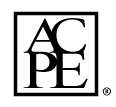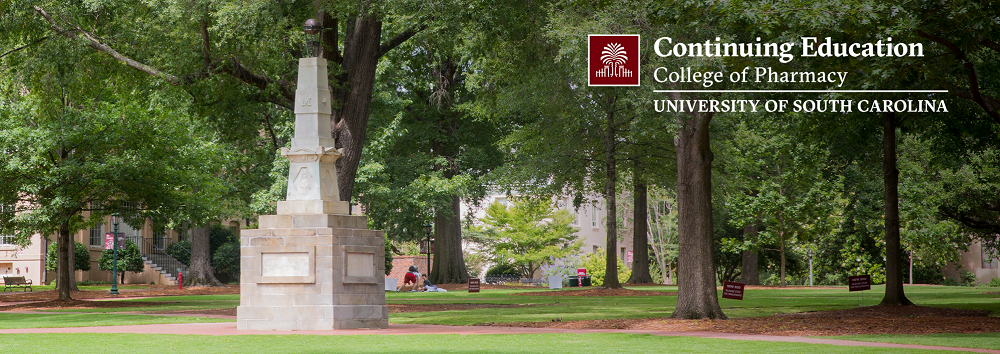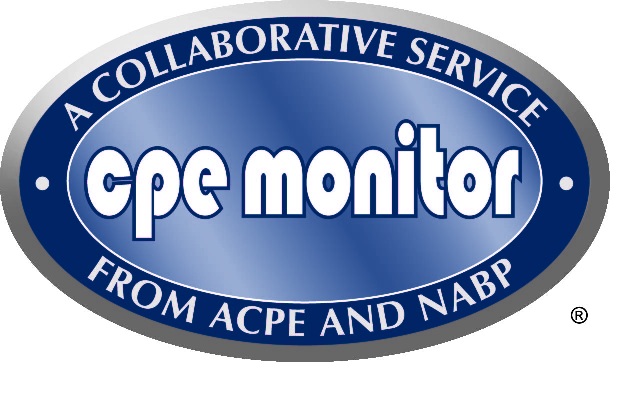
- Early registration required to receive discounted rate of $110 for pharmacists and $79 for technicians(includes continental breakfast and box lunch)
- We encourage you to register on line at http://SCCP.learningexpressce.com
- Registrations will increase by $10 after November 4, 2016 to $120 for pharmacists and $89 for technicians.
- You may call or email for more information: Cori Fairchild @ (803) 777-9979 or email@ ce.sccp.sc.edu
 Accreditation: The South Carolina College of Pharmacy is accredited by the Accreditation Council for Pharmacy Education as a provider of continuing pharmacy education. This program has been accredited for 6.0 live contact hours (0.6 CEUs) for pharmacists and pharmacy technicians, including 1.25 hours of law. Participants must sign in and attend all sessions for maximum credit. Participants must complete an on-line evaluation within 30 days to facilitate transmission to the CPE Monitor. Failure to provide correct and/or complete information may result in your activity not being reported to the CPE Monitor. ACPE now requires that all credit be claimed and reported within 60 days after the live event. This is a knowledge based learning activity.
Accreditation: The South Carolina College of Pharmacy is accredited by the Accreditation Council for Pharmacy Education as a provider of continuing pharmacy education. This program has been accredited for 6.0 live contact hours (0.6 CEUs) for pharmacists and pharmacy technicians, including 1.25 hours of law. Participants must sign in and attend all sessions for maximum credit. Participants must complete an on-line evaluation within 30 days to facilitate transmission to the CPE Monitor. Failure to provide correct and/or complete information may result in your activity not being reported to the CPE Monitor. ACPE now requires that all credit be claimed and reported within 60 days after the live event. This is a knowledge based learning activity.Date: Nov 12, 2016 08:00 AM - 03:45 PM
CE Hours
CE Units
Activity Type
- Knowledge
Target Audience(s)
- Pharmacy Technicians
Accreditation(s)

|
The University of South Carolina College of Pharmacy is accredited by the Accreditation Council for Pharmacy Education as a provider of continuing pharmacy education.
|
Requirements for CE Credit
2. Describe pharmacy-specific quality metrics.
3. Analyze the impact quality metrics will have on pharmacy practice.
4. List the roles technicians can play to improve quality of care provided in a community pharmacy setting.
5. Provide examples of current MTM programs in South Carolina.
6. Discuss the technicians role in providing a successful MTM program.
Speaker(s)/Author(s)
|
Patricia Fabel, PharmD, BCPS
|
Activity Number
0062-0000-16-165-L04-TCE Hours
1. Describe best practices for pharmacy-based immunization delivery
2. Identify opportunities to improve vaccination rates
3. Describe the role of the pharmacy technician in improving the efficiency of immunization delivery
Speaker(s)/Author(s)
|
Betsy Blake, PharmD, BCPS, FNAP
|
Activity Number
0062-0000-16-166-L01-TCE Hours
- Identify different classes/ agents available to treat type 2 diabetes
- Explain the importance of incorporating lifestyle modifications in patients with diabetes
- Discuss updated guidelines for patients with diabetes including appropriate recommendations and schedules for blood glucose monitoring
Speaker(s)/Author(s)
|
Betsy Blake, PharmD, BCPS, FNAP
|
Activity Number
0062-0000-16-167-L01-TCE Hours
1. Describe the current status of USP <800> implementation.
2. Describe the process to identify drugs that would be considered hazardous drugs.
3. Describe the precautions and operating procedures needed to comply with USP <800>.
4. Identify resources available to assist pharmacists with USP <800> compliance and implementation.
Speaker(s)/Author(s)
|
Bryan Ziegler, PharmD, MBA
|

